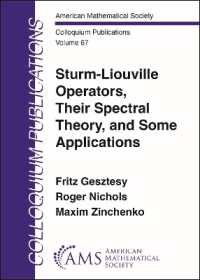- ホーム
- > 洋書
- > ドイツ書
- > Social Sciences, Jurisprudence & Economy
- > Education Science / Pedagogic
- > public education (school & university)
Full Description
This volume brings together diverse thinkers and practitioners on Participatory Action Research (PAR) and educational development in South Asia. Contributors draw from their research and field experiences on how PAR is currently being understood, theorized, debated, and implemented for education of children in South Asia. This book will act as a key reference text for academics, students, and practitioners interested in the intersection of education and participatory development in the region. The book opens a constructive debate on PAR approaches to education and proposes a reflective framework that allows the reader to develop their perspectives about the conceptual, methodological, and sociopolitical potential and limitations of participatory approaches.
Contents
Introduction: Participatory Action Research and Education - Key Approaches and Debates.- Chapter 1. Defining PAR to Refine PAR: Theorizing Participatory Action Research in South Asian Educational Contexts.- Chapter 2. Utilizing "a version of PAR" to explore children's voices on inclusion: The case of two primary schools in Bangladesh.- Chapter 3. The ASER 'Translating Policy into Practice' Toolkit: From Participatory Action Research to Evidence-Based Action.- Chapter 4. Northern Province Education System in Sri Lanka: Participatory Review, Recommendation, Implementation and Monitoring.- Chapter 5. Unpacking Participation: The Case of Child-Centered Pedagogy in India.- Chapter 6. Learning and evolving in Hybrid Learning: a PAR perspective.- Chapter 7. Reclaiming the collective: challenging neoliberal ideology through PAR.- Chapter 8. Applying participatory action research to program evaluation in education policy.- Case Study 1: Photovoice & Girls' Education in Gujarat, India.- CaseStudy 2: Utilizing memoing as a reflexive tool in PAR.- Case Study 3: One Moment of Participatory Data Analysis.- Case Study 4: Shikshagiri - Including Marginalised children in Policy and Praxis of Education.- Conclusion: Reading and Rewriting South Asia.








